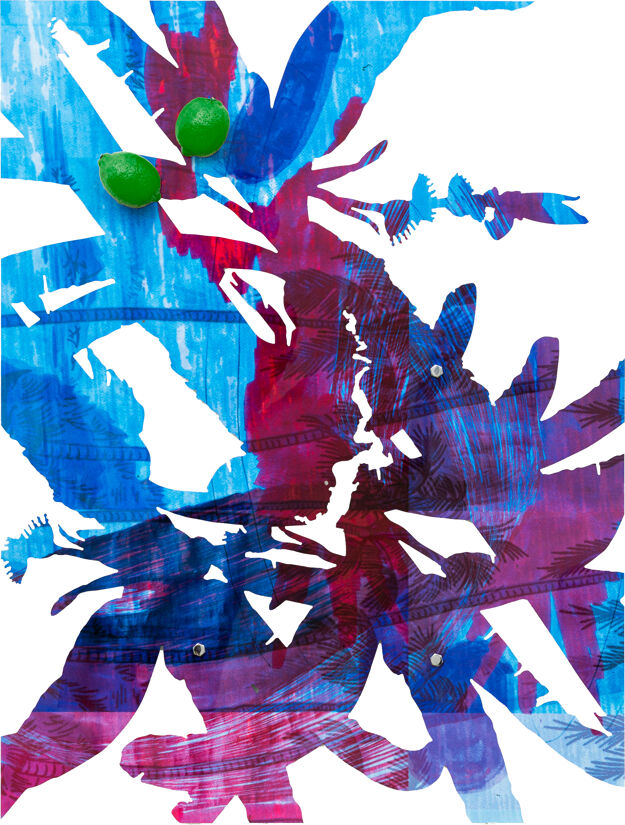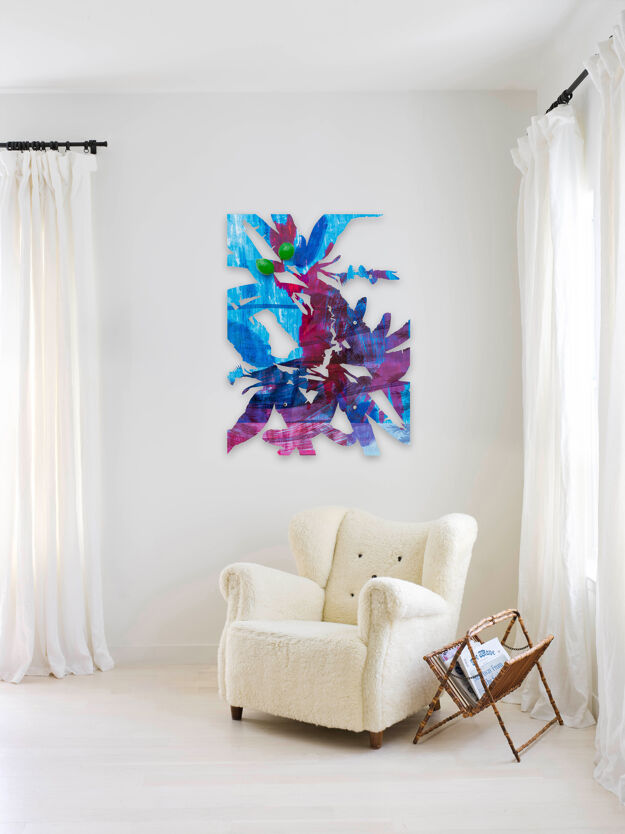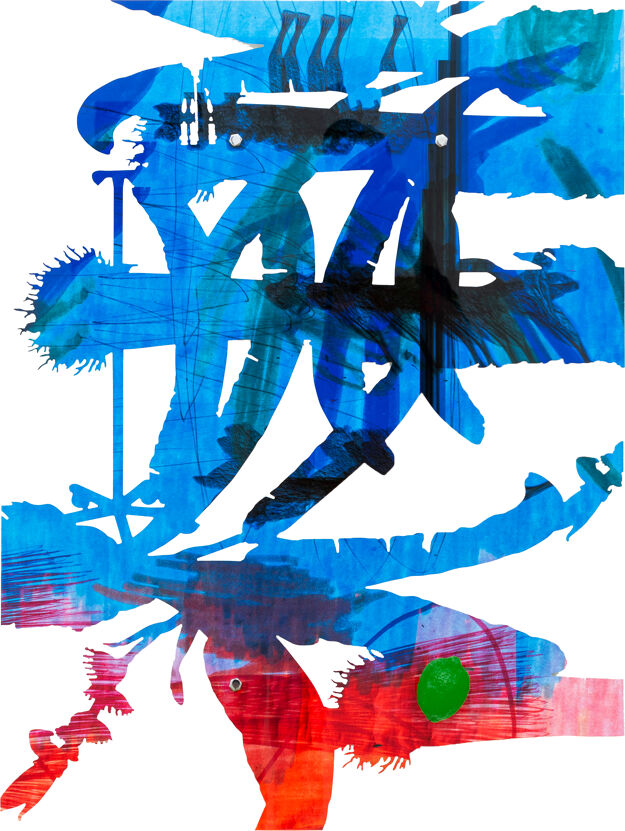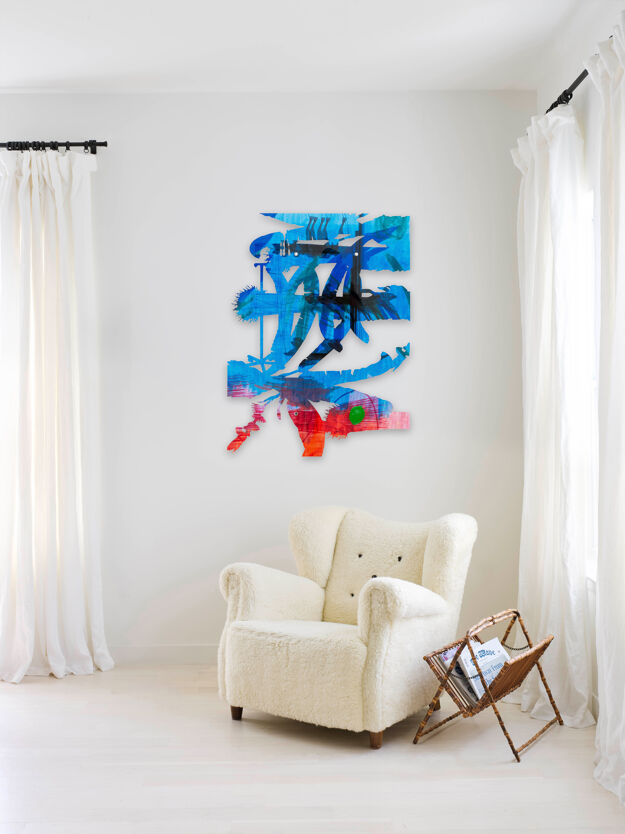SPOTLIGHT:
JULIEN CREUZET
The artist on why art, music and poetry are really all one and the same.
What do you think makes a work of art good?
I think it’s the necessity of the work. Sometimes, things are very difficult to explain with normal sentences or words. I think poetry and art can make the question of shape a solution. Poetry allows you to put together impossible things. In artwork, you can put many secrets inside.
With exhibitions, you need to explain and have a detailed plaque, but art doesn’t need to explain everything. Everything is already put inside the work. I’ve decided to be more opaque and put more and more inside my work. I think it’s important for the artwork to exist and not only be one illustration of one specific subject. That’s not really interesting. I think for the artwork to have more power and energy, it’s important for it to exist and resist all the different aspects of interpretation.
Do you agree with the way people interpret or write about your work?
It depends where I am. For example, in Europe, I’m a Black artist from the Caribbean who grew up in Martinique. I think I can work on many different subjects, but sometimes, some people make things limiting. They think the work can speak only about questions of colonization because people only see this aspect of the work. But the work has more details and more secrets. It’s not only about that because I’m trying to accept all the different parts of my life. I’m trying to organize all of the different elements, to make a beautiful poem, a sculpture or record a song. I need to accept what people want to say and work with those parameters. I need to be more opaque if I want to be more free with what I produce and play with what people see. The artist can manipulate people’s perceptions.
People usually think of poetry and the visual arts as separate, but you combine them in a lot of ways. What makes you interested in that fusion?
For me, it’s all just one thing. One day, you can have a different energy inside your body or a different question about what to do with your life or the relationship you have with someone. And all the different parts of your life make up what you are. I don’t want to make a distinction between any creative category. I think it’s easy to understand the relationship between poetry and a sculpture, for example, because I think a sculpture is a form of physical poetry. A painting is also a kind of poetry.
With that, I think you can start with the question of the title. And the title is maybe the first point for trying to explain or translate the energy of the work. With poetry, I can give information differently for people to understand the complexity without explaining directly. I make an association between two pieces, to create a family link between the title and the sculpture.
Do titles come at the end of the process for you or are those something you think of before you start making a work?
I have different times for that. I can go have a party tonight and take the metro and a bus and arrive at my meeting. And between these moments, I can take my smartphone and start to write because I feel some kind of energy. When I come back to my studio, I have this story and I continue with the sculpture.
For me, it’s not another aspect of my life or my process, it’s the same thing. The energy I feel at night and during other times influences what I’m going to produce tomorrow. It depends because I can use the text I produced this morning for the sculpture I’m going to produce this afternoon. In that sense, I can write things before or after.
What are some of the experiments in art today that you find really interesting?
Cinema is really interesting because inside cinema you can have a sculpture, you can have a performance, you can have poetry, you can have costumes, you can have photography, you can have a painting. The only thing I don’t like with cinema is the authority of the duration and the authority to sit during this duration. If you start with the idea of more extended cinema, like an exhibition with all these parameters, it can be more like live performance. In the same way, it can be an exhibition. I think that’s a more interesting solution for me, the aspects of the creation I like in this moment. I like the idea of movement, I like the idea of surprise, while also playing with different perceptions.
Are you a cinephile? Do you a watch a lot of film?
Not much. I know people who are crazier about that. I think I’m more a mélomane [music lover].
What do you listen to as you go about your work?
It depends on the people I’m working with during the day. For example, I see a friend and when we are together, we listen to a lot of pop music, but it can change. We can start with experimental music and then go to a rock album and then finish with French rap music. Before the end of the day, we can take a drink of rum and listen to Caribbean trap music in Creole.
Are there any habits you have as you work on art?
Not really because things change a lot. I don’t have a specific routine. I guess my ritual could be that I don’t work alone and have different people work with me. I like the coffee time when you feel the energy and you can share news with your friends and your community before you start work.
Who do you usually work with?
Today, I’m working with Louis. He’s a young painter with a good intuition about painting. I like how he can share his intuition with me about a painting question to help answer a sculpture question. We can exchange in this way.
Do you have any passions outside of your work?
My music because I started with music when I was a teenager. I wanted to be a rapper and I never stopped writing songs. The ideas for the lyrics give the ideas for the poetry and the poetry gives the idea for the title. Now, I’m continuing to produce music, not only for myself. For example, I’m working with an opera singer. I’m trying to help her to produce an EP with five tracks. We have a session about writing and how to compose.
Do you consider your art and your music part of the same practice?
For me, it’s the same thing, but I need to make some kind of a distinction. At the moment, I don’t know the music world, I don’t know the system. I’m reading about it and watching many interviews with producers. My base is more the contemporary art world. In this movement, I can use the energy of the music. People in art don't always understand, but it's becoming easier as more contemporary artists are also creating music.
What made you decide not to become a rapper and focus more on art?
You know how sometimes you make a choice for your parents? If you explain to your parents that you want to be a teacher, it’s easier for them to accept than to study in art school. That was my beginning. That’s one point. The second point is, the more I went into this work, I understood I wanted to be an artist and not teach directly. I needed to prove to my parents it was possible and it took time. It’s very hard for people to understand. You start to live with your work and you can’t pay your rent. There was a different economic aspect to life. Ten years later, starting in October, I’m going to be a teacher at the École des Beaux Arts in Paris, the famous art school. And I can teach sculpture and have a class for the first time in my life. It was a new moment for my career and it can be really important to work in a new way and how I can continue to share my love of contemporary art with the young generation. And my parents are very happy [laughs].
Is the idea of mentoring young artists important to you?
Good question. It’s very new. I’ll make a strange transition. Where I’m from, it’s difficult for the students to have access to the contemporary art world. My idea is to share my work with these communities and what I’ve learned over the last 15 years. That’s when my idea for being a teacher started. I want this generation in the Caribbean to understand how you can speak with the rest of the world. It’s a very important moment when people invite you to teach at this type of art school. The idea with this art school – it’s a very old process but very interesting – you have a class made up of students from different years and you can choose your students. Every year in September, the students go to visit you and make a presentation and ask you to be a part of your class. That’s a strange particularity of the Paris art school.
Is there anything you wish people would ask about you or your work more often?
For some people in the art world, you’re like a Disney attraction. It’s a bit weird because, not to make a generality, some people in that type of group don’t watch for real art and just want you to explain what there is to understand. That’s a bit horrible to me. Now, I don’t want to do that. I want people to take more time with the work, to spend more time in the exhibition. I don’t think people need me to understand it. People need to be lost a bit, even for a moment, inside a show. That’s more and more important to me.



